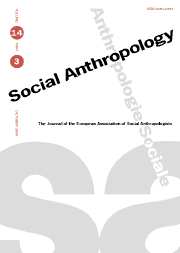Milk kinship in Southeast Europe. Alternative social structures and foster relations in the Caucasus and the Balkans
Published online by Cambridge University Press: 13 December 2004
Abstract
Developing an earlier analysis of milk kinship allegiance in the Hindu Kush mountains of northern Pakistan – elaborated along the lines of Eugene Hammel's pioneering analysis of Serbian spiritual kinship – this essay appropriately returns to other ethnographies of adoptive kinship in Southeast Europe. I examine a hitherto neglected account of milk kinship and child fosterage in the Caucasian statelet of Abkhazia, comparing its tributary formations of clientage with apparently similar institutions of milk kinship documented in the Balkans. It is suggested that reiterated ties of milk kinship were often combined with spiritual sponsorship among both Muslim and Christian populations of Southeast Europe, comprising reciprocal allegiances of co-parenthood between asymmetrically ranked but allied descent lines. The comparative anthropological implications of these composite ‘alternative social structures’ of constructed kinship – orchestrating feudatory allegiances and inter-ethnic alliances throughout Southeast Europe – are discussed in the conclusion. This indicates the broader theoretical significance of Hammel's Serbian ethnography in understanding the social and political assortment of ‘elementary structures’ of adoptive kinship in peripheral regions throughout western Eurasia, where milk kinship orchestrated by women has often played a formative political role.
En reprenant une analyse antérieure de la fidélité à la parenté par allaitement dans les montagnes Hindu Kush du Nord du Pakistan (élaborée d'après l'analyse pionnière faite par Eugène Hammel de la parenté spirituelle Serbe) cet essai retourne de manière appropriée vers d'autres ethnographies de parenté par adoption dans le Sud-est de l'Europe. J'examine un récit jusque là négligé de parenté par allaitement et par lien nourricier en Abkhazia dans le Caucase, en comparant ses tributs pour la formation de clientèles avec des institutions apparemment similaires de parenté par allaitement documentées dans les Balkans. Nous suggérons que des liens réitérés de parenté par allaitement étaient souvent combinés avec un parrainage spirituel dans les populations musulmane et chrétienne du Sud-est de l'Europe, comprenant des allégeances réciproques de co-parentalité entre des lignées de descendance occupant des rangs différents mais néanmoins alliées. Les implications anthropologiques comparatives de ces ‘structures sociales alternatives’ composites de parenté construite (orchestrant des allégeances féodales et des alliances inter-ethniques à travers le Sud-est de l'Europe) sont examinées dans la conclusion. Ceci révèle la portée théorique plus large de l'ethnographie serbe de Hammel pour la compréhension de l'assortiment social et politique de ‘structures élémentaires’ de parenté par adoption dans les régions périphériques à travers l'Eurasie de l'Ouest, où la parenté par allaitement orchestrée par les femmes a souvent joué un rôle politique formateur.
Ansetzend bei früheren Analysen der Milchverwandtschaftsallianzen in den Hindu Kush Bergen des nördlichen Pakistans – entwickelt auf Basis von Eugene Hammels Pionierarbeiten über serbische spirituelle Verwandtschaft – greift dieser Aufsatz auf andere Ethnographien über adoptive Verwandtschaft in Südost Europa zurück. Ich untersuche die bisher vernachlässigten Berichte über Milchverwandtschaft und Pflegekinder im kaukasischen Kleinstaat Abkahazia und vergleiche seine tributpflichtigen Klientelformationen mit scheinbar ähnlichen Institutionen der Milchverwandtschaft, die in den Balkanländern dokumentiert wurden. Oftmals wurden unter der moslemischen und christlichen Bevölkerung in Südost Europa die betonten Bande der Milchverwandtschaft mit spiritueller Schirmherrschaft verbunden. In diesen Banden ging es um reziproke Allianzen der Co-Elternschaft zwischen asymmetrische geordneten, aber verbundenen Abstammungslinien. Die Konklusion diskutiert die Implikationen dieser zusammengesetzten, alternativen sozialen Strukturen konstruierter Verwandtschaft, die feudale Treuebündnisse und inter-ethnische Allianzen in ganz Süd-Ost Europa orchestrieren, für den ethnologischen Vergleich. Dies deutet auf die weitere theoretische Bedeutung von Hammels serbischer Ethnographie für das Verstehen der sozialen und politischen elementaren Strukturen der Adoptionsverwandtschaft in den Randregionen des westlichen Eurasien hin, wo Milchverwandtschaft – orchestriert von Frauen – oftmals eine formative politische Rolle gespielt hat.
Desarrollando un análisis anterior sobre la fidelidad del parentesco por amamantamiento entre las montañas Hindu Kush del norte de Pakistan – elaborada siguiendo el análisis pionero de Eugene Hammel del parentesco espiritual serbio – este ensayo retorna a otras etnografías sobre parentesco adoptivo en Europa del Sud-oeste. Examino una versión hasta ahora descuidada del parentesco por amamantamiento y la crianza en Abkhazia en el Caúcaso, comparando sus tributos para la formación de clientelas con aparentemente similares instituciones documentadas para los Balcanes. Se sugiero que lazos de parentesco por amamantamiento fueron a menudo combinados con el patrocinio espiritual entre las poblaciones musulmanas y cristianas de Europa del Sud-oeste, incluyendo fidelidades recíprocas de compadrazgo entre lineas de descendencia asimetricamente clasificadas pero aliadas. Las implicaciones comparativas antropológicas de estas alternativas estructuras sociales de parentesco construído – orquestando lealtades de enemistad y alianzas inter-étnicas a través de Europa del Sud-Oeste – se discuten en la conclusión. Esto indica el significado teórico más amplio de la etnografía serbia de Hammel en la comprensión de la clasificación social y políticas de las estructuras elementales del parentesco por adopción en regiones periféricas a lo largo de Eurasia del oeste, en donde el parentesco por amamantamiento orquestado por mujeres ha frecuentemente jugado un rol importante en la política.
- Type
- Research Article
- Information
- Copyright
- © Cambridge University Press 2004
Footnotes
- 14
- Cited by




